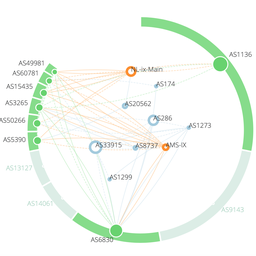As planning for the next World Telecommunication Standardization Assembly (WTSA-20) continues, proposals around New IP and challenges from COVID-19 continue to draw focus.
The World Telecommunication Standardization Assembly (WTSA) is held every four years with the aim of helping define the next period of study for the ITU Telecommunication Standardization Sector (ITU-T). As preparations continue, I want to give a quick update on what has - or more importantly what hasn't - changed for New IP in the lead up to WTSA-20. While I'm at it, I'll also share some broader developments on how the pandemic looks set to further impact the ITU's meeting calendar.
Progress on New IP
Last April, I wrote an article expressing concerns around proposals for New IP. Since then, unfortunately, not a lot of progress has been made. Proponents of these proposals still haven't brought forward any convincing arguments as to why this work is required. Nor has it been shown how this wouldn't be a duplication of work already being done in other standards organisations, including the IETF.
Study group 11 and study group 13 (see ITU study groups) are still discussing a number of contested questions that would need to be resolved before work starts on New IP. Together with a number of like-minded countries and organisations, we have made a number of contributions to these study groups, as well as to the parent Telecommunications Standardisation Advisory Group (TSAG), with the aim of making our objections clear and emphasising our concerns. We have published these contributions on our website for reference.
Name change: Future Vertical Communications Networks (FCVN)
The only noticeable change to New IP is that its proponents have come forward with a proposal to change its name into "Future Vertical Communications Networks" (FCVN). While the new name makes it less obvious that the proposed technology is about the Internet and the replacement of some of its core parts, the substance of the proposal remains unaltered.
As such, the underlying rationale - e.g. that TCP/IP is not fit-for-purpose - remains flawed. Although many of the technical details remain unknown, this proposal is directly linked to the systems and protocols that we commonly refer to as the Internet. It seeks to replace some of the core functionality those systems and protocols provide, altering the idea that the end points should have full control and that the network should simply forward packets in a neutral manner, totally agnostic of the application layers above or the physical layers below.
This means our concerns and objections remain the same: there is no apparent need for such a technology; many of the proposed parts are a duplication of developments already being worked on in other forums. We are happy to see that many organisations, including some of our members, have put forward similar concerns, such as the position recently released by ETNO and this analysis published by ICANN.
The postponement of the World Telecommunications Standardisation Assembly (WTSA-20) has meant that there will be time for a number of additional meetings, which will take place in the third week of December, to finalise on a number of key items including New IP. There are also a number of shorter ad-hoc meetings scheduled ahead of all this to try and find agreement on a compromise proposal, which could then be considered and approved at the following meetings.
Postponement and Planning of Meetings
As countries throughout our service region go back into lockdown, it's become pretty clear that COVID-19 and the difficulties it brings for travelling and meeting in person are set to remain for some time to come. As a result, the ITU is having to review its meeting schedule for 2021 and even beyond. WTSA-20, originally scheduled for later this month, was already postponed to March next year, and in light of current developments, it's unlikely that the meeting will take place as planned in Hyderabad, India. In response, the Indian government has now put forward a proposal to further postpone WTSA-20 until March 2022.
The downside
While that might seem a good idea at first glance, there are considerable drawbacks to this proposal. Large assemblies like this are supposed to take place every four years and are purposely organised in a staggered fashion to spread the workload. The original decision to postpone to March 2021 already meant that this meeting would take place very close to the World Telecommunications Development Conference, still scheduled to take place in Addis Ababa in November next year. However, bringing the conference into 2022 will mean it gets equally close to the next ITU Plenipotentiary Conference, scheduled to take place in Bucharest in the autumn of 2022.
There are no easy answers here, especially given that other large conferences, such as the World Telecommunications Policy Forum (WTPF), has now also been postponed to June 2022. There is still some discussion whether it would be feasible to have WTSA-20 go ahead as scheduled in 2021, in the form of a hybrid and mostly virtual meeting. The idea would be to have a small number of representatives, where possible, meeting in Geneva to take care of the very minimal set of decisions that are required and expected to be made by the meeting, such as elections for the various chair and vice-chair positions. A number of European countries have prepared a contribution to the upcoming discussion, that lays out the several pros and cons of the different options.
The mixed virtues of virtual meetings
Although we have seen many meetings, including those of RIPE, continue successfully in a virtual format, having such a large and important meeting as WTSA-20 turning towards a virtual or hybrid meeting will certainly not be ideal. There has to be a considerable reduction in agenda items and a very strict time plan has to be followed, which would allow for the global community to effectively participate. What is more, without the ability of quick informal talks in the hallways to seek compromise, some topics might not be very well suited for such a format, given the risk that those negotiations in an online setting might not be successful.
However, as a relatively small sector member, a limited hybrid meeting in Q1 2021 still would have our preference over further postponing the meeting to 2022. While we certainly appreciate the generous offer of the Indian government to host the conference, we can't be certain what the situation in 2022 will be. We of course hope that by then things will be better and we can resume our traditional working methods. And in turn, we also hope this will bring future opportunities to welcome the global community to India for another meeting of the size and stature of WTSA.
But, as before, having a significant number of large conferences and assemblies to take place in a 12 month period would mean that we have to make tough choices. Our team that engages with the ITU is still relatively small and we also have to take into account all our other events, including RIPE meetings, which demand considerable amounts of our time. Not being able to fully participate in all these meetings would not only be a waste of our investment in the preparation, but more importantly, we are probably not the only ones who see themselves unable to commit the resources needed to participate. This would mean that the considerable efforts by ITU to encourage industry participation, especially from the SMEs, have been in vain.
Summing up
With all this in mind, we hope and trust that, in the coming weeks, the members of ITU Council will carefully consider all arguments and find a solution going forward. Procedurally, we do not expect any decision to be formalised before the end of December, which means that preparations for the conferences continue as planned for now. Meanwhile, we remain engaged with the various study groups and TSAG and we will report on any progress being made there.





Comments 0
The comments section is closed for articles published more than a year ago. If you'd like to inform us of any issues, please contact us.